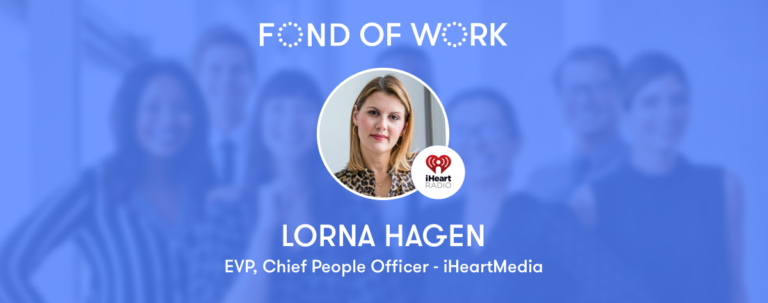
This time for Fond of Work, we spoke with Lorna Hagen, EVP and Chief People Officer at iHeartMedia. Lorna is an HR executive with experience in delivering innovative employee experiences and people solutions to drive business strategies. Lorna specializes in driving change to transform business cultures for high-growth startups, SaaS companies, financial services, e-commerce, publishing, media, retail, and hospitality industries. Learn more about her journey below.
How did you first get into the HR space?
I first got into the HR space through the first job I had in college, which was managing a group of 60 employees in a corporate dining cafeteria on Wall Street. They were all hourly employees and there were so many employee relations issues involved, but I believe that’s probably what propelled me into doing HR full-time versus operations. I just didn’t know it at the time. Eventually I made a decision to go into HR. About two years after that, I ended up as an HR coordinator at a sports management firm.
How did you end up at your current position?
The first part of my career was spent at large companies, and I’m really grateful for that because it gave me a lot of visibility into how complex organizations work. I was able to see all the nuts and bolts as I was coming up the career ladder. I eventually became very close to the executive leadership team and CEOs of a few companies.
 However, after doing that, I decided I wanted to take a bit of a risk in my career and became the Chief People Officer at a FinTech startup. In my five years there, we grew the company to almost 700 employees and had one of the most successful IPOs in New York City history. Eventually, I started combining my learnings at the big companies with what I learned at the startup to have a very unique vantage point. I now have an understanding of the discipline and processes of a large enterprise as well as building culture, which helps startups thrive.
However, after doing that, I decided I wanted to take a bit of a risk in my career and became the Chief People Officer at a FinTech startup. In my five years there, we grew the company to almost 700 employees and had one of the most successful IPOs in New York City history. Eventually, I started combining my learnings at the big companies with what I learned at the startup to have a very unique vantage point. I now have an understanding of the discipline and processes of a large enterprise as well as building culture, which helps startups thrive.
iHeartMedia is going through an incredible transformation right now. We’re taking an incredibly successful audio company and setting it up to be not only the number one audio company in the country, but a preeminent media player. That’s only going to happen with a keen understanding of what got us here.
Why are you fond of your work?
Just first and foremost, I love what I do. I’m good at it, so that sense of building strong companies and engaged employees gives me a lot of satisfaction. I can make a very direct line between the work I’m doing as an HR executive to the success of the company, so I love that.
 I also love having the ability to teach my own children through what I do. I try to instill in them the idea of working hard and seeing how that pays off, whether it’s in just personal or emotional satisfaction or in the quality of life that I can give our family. How they see that hard work and perseverance really does pay off. That’s one of the pieces that make me really fond of what I do.
I also love having the ability to teach my own children through what I do. I try to instill in them the idea of working hard and seeing how that pays off, whether it’s in just personal or emotional satisfaction or in the quality of life that I can give our family. How they see that hard work and perseverance really does pay off. That’s one of the pieces that make me really fond of what I do.
Why do you think HR is an important department for businesses to have?
I think the big mess still with the HR perception is the undying belief that HR employees are social workers. The most interesting organizations actually use their leaders and their entire HR teams as partners in the business. They help make decisions around products, M&A, and entering new markets. It’s just as critical to have your HR leader involved in decisions about talent pools or HR technology or whether performance reviews should have ratings or not. I remember having an interview with a CEO who paused our conversation midway and asked me if I was there for a strategy job or an HR job. My first thought was that the CEO had no idea what HR leaders do.
 What’s your management philosophy? How do you apply it at your company?
What’s your management philosophy? How do you apply it at your company?
One of the best pieces of advice I received was to remember that in a leadership role, now you work for your employees — they don’t work for you. I think that’s a really great point of view to have, especially when leading big teams. Ideas can come from anywhere, and I believe my job is to open up the conversation to let ideas flow through our organization and make our company stronger.
How do you reward and recognize employees?
At iHeartMedia, we reward and recognize our employees in a variety of different ways. We offer:
 A wide array of discounts on everything from merchandise, tickets, cruises, and health and wellness plans
A wide array of discounts on everything from merchandise, tickets, cruises, and health and wellness plans- We have a two-tier sales recognition program — our iHeartMedia President’s Club and iHeartMedia CEO’s Club — that recognize our top sales performers around the country
- We have a speaker series, the iHeartMedia Learning Series, that brings in presenters to discuss anything benefiting employees both personally and professionally (empowerment, leadership, health & wellness, financial planning, etc.)
- We host iHeartRadio Live Sessions, where artists will perform 3-5 song sets for our employees in the office
Why do you think employee recognition matters?
We all know this, right? Academically, we know that people who feel they’re recognized for their work, their performance, and on their merits are providing a different level of productivity to your company. Like science says, people need to feel that recognition, that engagement, and that acknowledgement to know what they do does matter.
 I think, ultimately, that’s the most important thing. Companies can’t operate without understanding that an employment relationship is exactly that — a two-way relationship. What you put in to it is what you’re going to get out of it. Sometimes, I think how silly of us that we forget that a simple thank you is good enough to make somebody feel great about the level of effort they’re putting into your company. Whether it’s that simple or whether you have a sophisticated program, I think we all have this responsibility to evaluate how we’re recognizing our employees to make our companies more successful.
I think, ultimately, that’s the most important thing. Companies can’t operate without understanding that an employment relationship is exactly that — a two-way relationship. What you put in to it is what you’re going to get out of it. Sometimes, I think how silly of us that we forget that a simple thank you is good enough to make somebody feel great about the level of effort they’re putting into your company. Whether it’s that simple or whether you have a sophisticated program, I think we all have this responsibility to evaluate how we’re recognizing our employees to make our companies more successful.
What’s the best advice you’ve received in your career?
I had a leader once tell me to be very selective as to who I hitched my wagon to. At first I didn’t understand what that meant, but eventually I came to realize that selecting your mentors and your sponsors are some of the most critical decisions you’re going to make in your career. I would definitely encourage all current and future leaders to think about this and to be intentional as to who they seek out to help them advance their careers.
What are some of the most pressing issues HR leaders face today?
This kind of idea of work being democratized is very interesting to me. For example: the walkouts at Google are fascinating. The crowdsourcing of information of employee data changes the whole landscape. I think that there are a lot of different hot spots in HR where employees are feeling like they have a different responsibility to themselves and to their colleagues. HR professionals need to start paying attention to that. A hierarchical top-down only management system is not always going to serve a leadership team if they don’t address concerns throughout the organization. That’s very much on my mind.
 New digital platforms to give score cards to companies are cropping up, like Glassdoor. I think they all serve really important missions, and yet I worry that in some of these (not all) the review system can be easily manipulated. Whoever complains the loudest or has the most outlandish comment about your company causes all eyeballs to go to that. You can say any untruth you want and everybody gravitates towards that. I worry a lot about what we need to do about this as leaders, and not just HR leaders — leaders in all roles at our companies. We all need to work together to make sure that the right conversations are happening, the right communication is happening, and that people really know the truth about what it’s like to work in and for our company. Those are two things that definitely keep me up at night.
New digital platforms to give score cards to companies are cropping up, like Glassdoor. I think they all serve really important missions, and yet I worry that in some of these (not all) the review system can be easily manipulated. Whoever complains the loudest or has the most outlandish comment about your company causes all eyeballs to go to that. You can say any untruth you want and everybody gravitates towards that. I worry a lot about what we need to do about this as leaders, and not just HR leaders — leaders in all roles at our companies. We all need to work together to make sure that the right conversations are happening, the right communication is happening, and that people really know the truth about what it’s like to work in and for our company. Those are two things that definitely keep me up at night.
The last one is automation of the workforce and how we work differently. Can you reduce your carbon footprint? Can you work smarter? Does technology actually replace your people? Or do we find different jobs as companies evolve? How quickly can we retrain them? That’s happening now. It’s not just the conversation for us to have about the future, and so that definitely is something that needs to be at the forefront of what every HR leader is thinking about.
What’s one thing you’ve had to learn the hard way in your career?
You know when you take a personality assessment — the MBTIS or discovery wheels — and you always get back what your profile is like? Turns out that I’m a little stubborn. I’m objective and fact-based, and I’ll argue either side of something. When things are obvious to me, I find it very difficult that other folks can’t see what I see. The notion that relationship building and influencing is such a critical piece of your job as you start growing in your career, which I’ve had to learn the hard way.
 I think we don’t spend enough time developing those skill sets for our employees. I don’t know that it’s the hard way, but it’s certainly one that I think about all the time. Like where were those conversations about influencing skills and relationship building? Even when you’re in college, right? Those things don’t come up. I’d be hard pressed to see how many business schools actually spend time on that. And, so certainly, one thing that I’ve thought long and hard about and may have worked on myself.
I think we don’t spend enough time developing those skill sets for our employees. I don’t know that it’s the hard way, but it’s certainly one that I think about all the time. Like where were those conversations about influencing skills and relationship building? Even when you’re in college, right? Those things don’t come up. I’d be hard pressed to see how many business schools actually spend time on that. And, so certainly, one thing that I’ve thought long and hard about and may have worked on myself.
Any advice for future HR leaders?
You know everybody says this, and I’m going to repeat it: You’re only good as your understanding of the business that you’re in.
Your number one relationship has to be with your CFO. If that’s not ironclad, you’re in trouble. I think investing time, space, and energy into that is really critical. I would also say, at this point, you need to form close relationships with your head of Engineering and Technology or IT. That triangle needs to be solid for you to be able to influence your company.
HR leaders are just starting to get elected to boards and featured in conferences beyond just the HR space. You really have an opportunity to be a business leader that leads with a human capital mindset as opposed to an HR leader that is trying to catch up on the business. Any future HR leader should think in this way.
Thanks so much to Lorna for taking the time to speak with us! Stay tuned for the next interview in the Fond of Work series, coming soon! By the way, iHeartMedia is hiring, so check out their website for their open positions.
Fond is a global SaaS platform that seamlessly consolidates employee rewards and recognition processes into one easy-to-use solution. For more information on how Fond can help you, request a demo today!
 What’s your management philosophy? How do you apply it at your company?
What’s your management philosophy? How do you apply it at your company? A wide array of discounts on everything from merchandise, tickets, cruises, and health and wellness plans
A wide array of discounts on everything from merchandise, tickets, cruises, and health and wellness plans